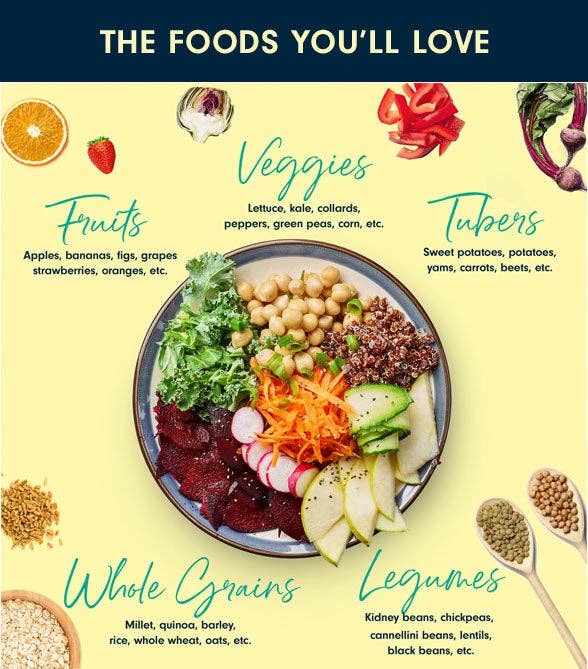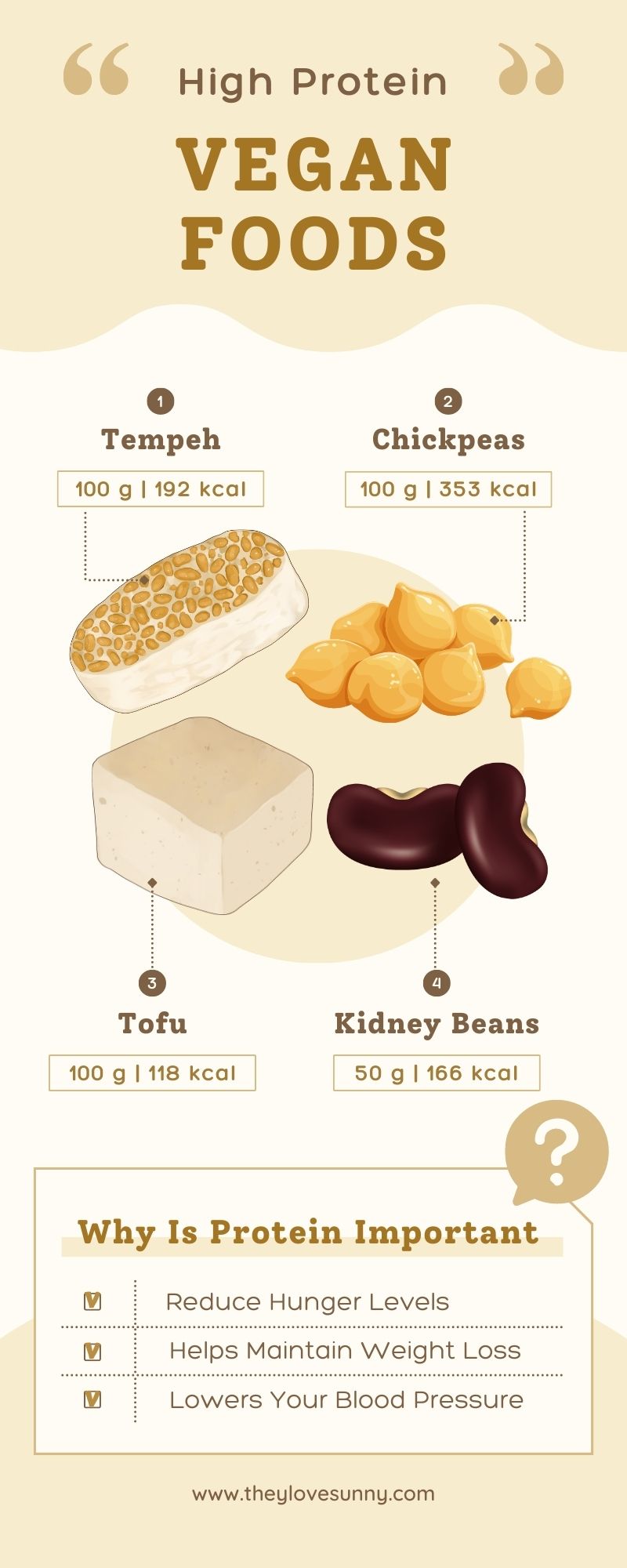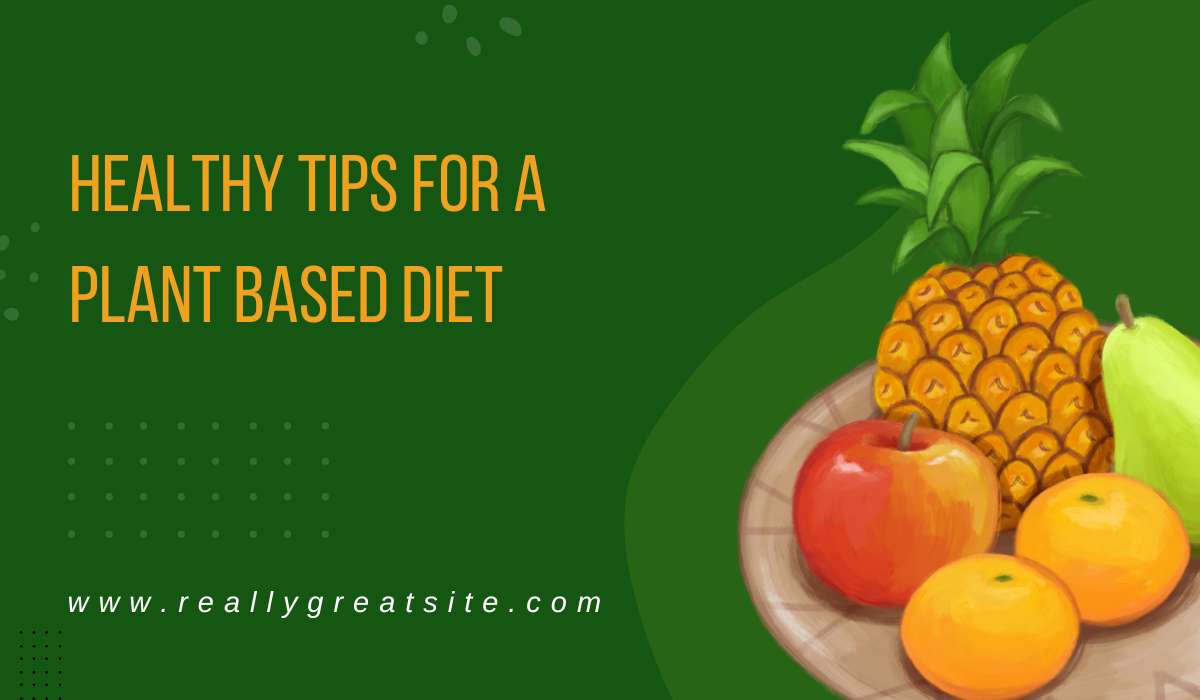Healthy Tips for a Plant Based Diet, If you’re looking to improve your health and make a positive impact on the environment, a plant-based diet is a great choice. Whether you’re a newbie or have been following this lifestyle for a while, this article will provide you with some healthy tips to make the most of your plant-based journey.
Switching to a plant-based diet means focusing on consuming foods that come from plants, such as fruits, vegetables, grains, legumes, nuts, and seeds. These foods offer a variety of nutrients and are rich in vitamins, minerals, and antioxidants that support your overall well-being.
Plant-based eating has numerous benefits. It can help you maintain a healthy weight, reduce the risk of chronic diseases like heart disease, and boost your immune system. Additionally, plant-based diets have been linked to increased energy levels, improved digestion, and better skin health.
It’s important to ensure that you’re getting all the essential nutrients on a plant-based diet. This includes protein, iron, calcium, omega-3 fatty acids, and vitamins like B12. Don’t worry – there are plenty of plant-based sources for these nutrients, and we’ll explore them later in this article.
Meal planning and finding delicious plant-based recipes are crucial for success. Planning your meals ahead of time can save you time, money, and make grocery shopping a breeze. Plus, experimenting with new recipes will keep your taste buds excited and prevent boredom.
Embarking on a plant-based diet also has a positive impact on the environment. Animal agriculture is a major contributor to greenhouse gas emissions and deforestation. By choosing plant-based options, you’re reducing your carbon footprint and promoting sustainability.
Stay tuned for more tips on meal planning, essential nutrients, plant-based protein sources, and the environmental impact of a plant-based diet. Get ready to embrace a healthier, plant-powered lifestyle!
Benefits of a Plant-Based Diet

A plant-based diet offers a wide range of benefits for your health and well-being. By choosing to focus on plant-based foods, you can experience a variety of positive changes in your body.
One of the key benefits of a plant-based diet is the ability to maintain a healthy weight. Plant-based foods are generally lower in calories and higher in fiber, helping you feel fuller for longer and reducing the likelihood of overeating.
In addition to weight management, a plant-based diet also lowers the risk of chronic diseases, such as heart disease. Plant-based foods are naturally low in saturated fats and cholesterol, which are known to contribute to heart problems. Instead, they are packed with heart-healthy nutrients like fiber, antioxidants, and essential vitamins and minerals.
Switching to a plant-based diet can also have a positive impact on your immune system. The abundance of antioxidants in plant-based foods helps strengthen your immune response, protecting you from common illnesses and infections.
Moreover, many people report increased energy levels and improved digestion on a plant-based diet. The high fiber content of plant-based foods aids in proper digestion and supports a healthy gut microbiome. Additionally, the vitamins and minerals found in these foods contribute to higher energy levels and overall vitality.
Lastly, a plant-based diet promotes healthier skin. The antioxidants found in fruits and vegetables help combat free radicals, which can cause premature aging and skin damage. By nourishing your body with plant-based foods, you can achieve a radiant complexion.
Overall, a plant-based diet offers numerous benefits for your health, including weight management, reduced risk of chronic diseases, improved immune function, increased energy levels, improved digestion, and healthier skin. By making the switch to plant-based eating, you can enjoy a healthier and more vibrant life.
Essential Nutrients on a Plant-Based Diet
A plant-based diet can provide all the essential nutrients your body needs to thrive. While it’s important to make sure you’re getting a variety of plant-based foods to meet your nutritional needs, there are a few key nutrients to pay attention to.
Protein: You can easily get enough protein on a plant-based diet by incorporating foods like legumes, nuts, seeds, tofu, and tempeh. These plant-based proteins are not only rich in protein, but also contain essential amino acids your body needs.
Iron: Plant-based sources of iron include leafy greens like spinach and kale, lentils, beans, quinoa, and fortified cereals. Pairing these foods with vitamin C-rich sources, such as citrus fruits or bell peppers, can enhance iron absorption.
Calcium: While calcium is often associated with dairy products, there are plenty of plant-based sources as well. Foods like kale, broccoli, almonds, chia seeds, and fortified plant-based milks and yogurts can help meet your calcium needs.
Vitamin B12: This important nutrient is mainly found in animal products, but you can get it through fortified plant-based foods like breakfast cereals, nutritional yeast, and plant-based milks. Consider talking to your healthcare provider about whether a B12 supplement may be beneficial.
Omega-3 fatty acids: Incorporating plant-based sources of omega-3s like chia seeds, flaxseeds, hemp seeds, and walnuts can help support brain health and reduce inflammation.
By focusing on obtaining these essential nutrients from a plant-based diet, you can ensure that your body is nourished and functioning optimally. Remember to eat a variety of plant-based foods to get the full spectrum of nutrients your body needs.
Meal Planning and Recipes

Meal planning is an essential aspect of maintaining a healthy plant-based diet. By planning your meals ahead of time, you can ensure that you’re getting a variety of nutrients and flavors in your diet.
Start by creating a weekly meal plan that includes a mix of whole grains, legumes, fruits, vegetables, nuts, and seeds. This will help you meet your nutritional needs and keep your meals exciting.
When it comes to recipes, the options are endless. Experiment with different plant-based dishes like stir-fries, salads, Buddha bowls, soups, and sandwiches. Look for recipes that incorporate a variety of vegetables and whole grains to maximize your nutrient intake.
To make meal planning easier, consider batch cooking on the weekends. Prepare large quantities of grains, legumes, and roasted vegetables that can be used as the base for different meals throughout the week. This way, you’ll have ready-made ingredients that can be quickly assembled into a delicious and nutritious meal.
Don’t be afraid to get creative with your ingredients. Explore different flavor profiles by incorporating spices, herbs, and condiments into your dishes. This will help keep your meals interesting and enjoyable.
Remember to listen to your body and adjust your meal plan accordingly. If you’re feeling hungry between meals, add in healthy snacks like raw nuts, seeds, or fresh fruit. And if you find yourself getting bored with your meals, don’t hesitate to try new recipes or seek inspiration from plant-based cookbooks or online resources.
With proper meal planning and a variety of recipes, you can easily maintain a nourishing and satisfying plant-based diet.
Plant-Based Protein Sources

When following a plant-based diet, it’s important to ensure that you’re getting enough protein. Luckily, there are plenty of plant-based protein sources available to meet your needs. Legumes, such as lentils, chickpeas, and black beans, are packed with protein and can be added to various dishes like soups, salads, and curries. Tofu and tempeh are also excellent sources of protein and can be used as a meat substitute in stir-fries or sandwiches.
Nuts and seeds, like almonds, walnuts, chia seeds, and hemp seeds, are not only high in protein but also provide essential healthy fats. These can be sprinkled on top of smoothies, yogurt, or salads for an extra protein boost. Quinoa, a complete protein, is a great grain option that can be used as a base for Buddha bowls or as a side dish.
Leafy greens like spinach, broccoli, and kale also contain a surprising amount of protein. These can be incorporated into your meals through salads, sautés, or green smoothies. Even whole grains like brown rice, oats, and whole wheat bread have a decent amount of protein to contribute to your plant-based diet.
It’s important to include a variety of these plant-based protein sources in your meals to ensure you’re getting all the essential amino acids your body needs. By combining different protein sources throughout the day, you can easily meet your protein requirements while enjoying delicious and nutritious plant-based meals.
Sustainability and Environmental Impact
When it comes to following a plant-based diet, the environmental benefits are significant. By choosing plant-based foods over animal products, you are reducing your carbon footprint and helping to combat climate change. Animal agriculture is a major contributor to greenhouse gas emissions, deforestation, and water pollution.
One of the biggest environmental impacts of animal agriculture is the amount of land required to raise livestock. Livestock production requires vast amounts of land for grazing and growing animal feed. This leads to deforestation, destruction of natural habitats, and loss of biodiversity.
Another environmental concern is water usage. Animal agriculture requires large amounts of water for animal drinking, cleaning, and growing feed crops. By opting for plant-based proteins, you can significantly reduce your water consumption and contribute to the conservation of this precious resource.
In addition to land and water usage, the production of animal products also contributes to air and water pollution. Animal waste can contaminate rivers and lakes, harming aquatic life and ecosystems. The methane gas emitted by livestock is a potent greenhouse gas that contributes to climate change.
By choosing plant-based protein sources, you are making a positive impact on the environment. By reducing consumption of animal products, you are promoting sustainable land use, conserving water, and reducing pollution levels. So, not only are you benefiting your health, but you are also doing your part in creating a more sustainable and environmentally friendly future.
Remember, small changes in your diet can make a big difference for our planet. So, go ahead and explore the wide variety of delicious plant-based protein sources available, knowing that you are making a positive difference for the health of both yourself and the environment.
Conclusion of Healthy Tips for a Plant Based Diet

In conclusion, a plant-based diet offers numerous health benefits, including a reduced risk of chronic diseases, improved energy levels, and weight management. By incorporating a variety of fruits, vegetables, whole grains, legumes, and plant-based proteins into your meals, you can ensure that you are getting all the necessary nutrients for optimal health.
To learn more about plant-based nutrition and find delicious recipes, there are plenty of resources available. Websites such as Forks Over Knives, NutritionFacts.org, and The Plant-Based Dietitian provide valuable information and recipe ideas to support your plant-based journey.
If you want to connect with others who follow a plant-based lifestyle, consider joining online communities or social media groups dedicated to plant-based eating. These platforms offer support, inspiration, and a wealth of knowledge from like-minded individuals.
Additionally, there are many plant-based cookbooks available that can guide you in preparing nutritious and delicious meals. Some highly recommended options include “Plant-Based Cookbook for Beginners” by Katie Banks, “Oh She Glows” by Angela Liddon, and “Thug Kitchen: Eat Like You Give a F*ck” by Michelle Davis and Matt Holloway.
Incorporating more plant-based foods into your diet is a journey that will greatly benefit your health and the environment. Remember to start small, make gradual changes, and be open to trying new flavors and recipes. By embracing a plant-based lifestyle, you are making a positive impact on your well-being and contributing to a more sustainable future for our planet.
For More Blogs visit Aerns

